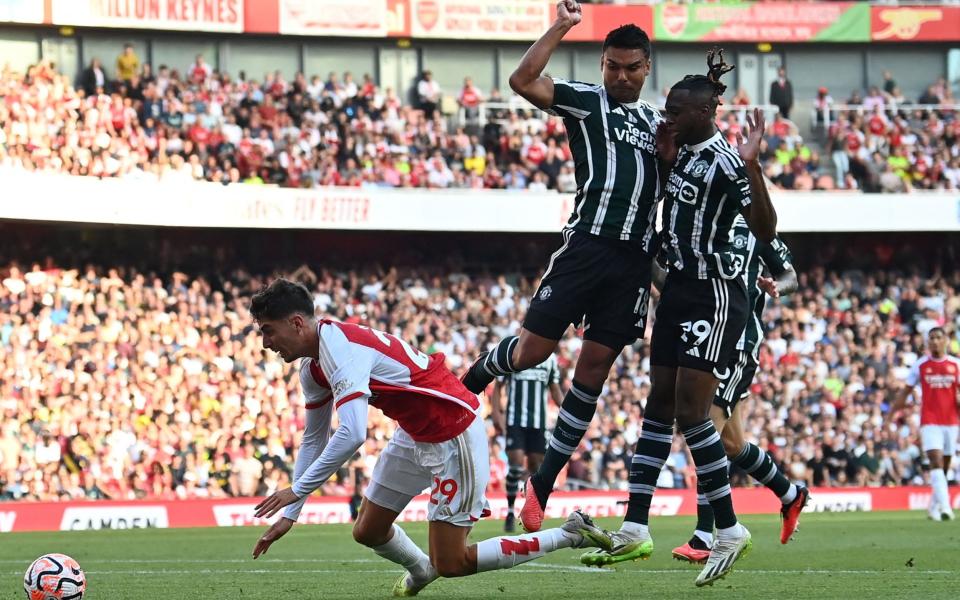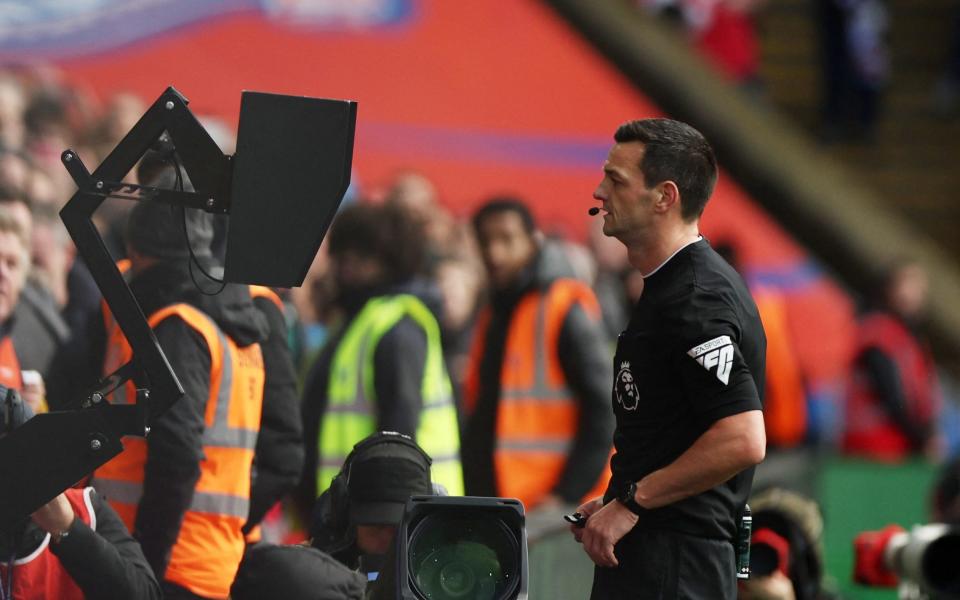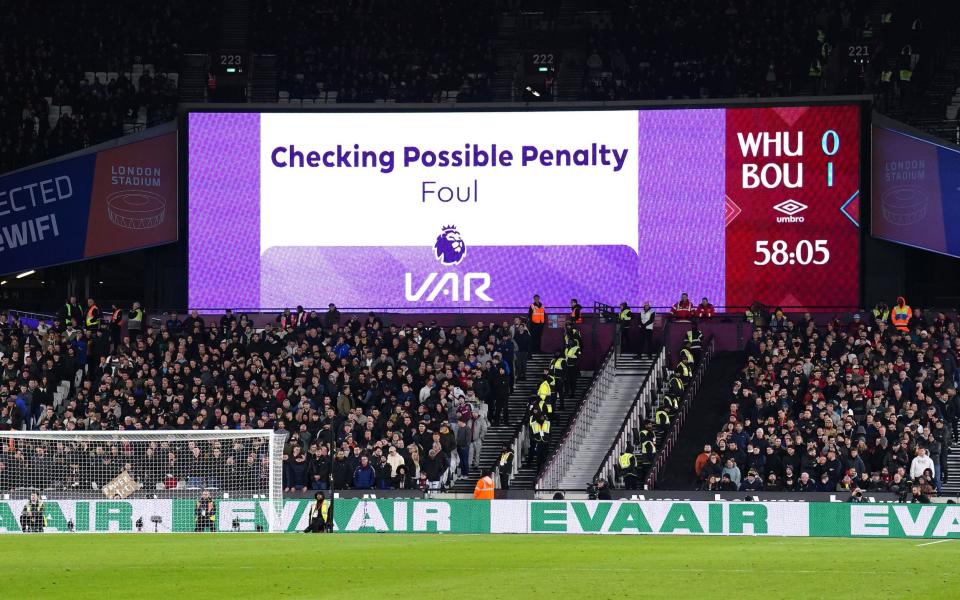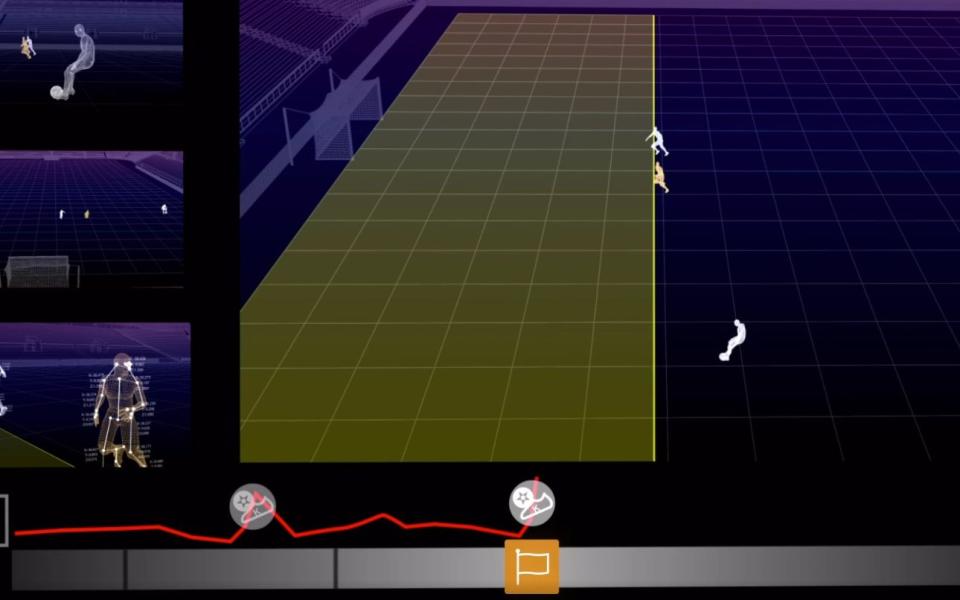The Premier League is pushing for VAR reform after admitting checks “took too long” and the fan experience was “not good enough”.
Tony Scholes, the top tier’s head of football, acknowledged that “we have work to do”, openly admitting technology was “poor” for those playing the game.
Scholes fiercely defended refereeing standards but admitted “clearly” that VAR was “not perfect”, outlining plans to speed up checks and improve stadium communications.
One development next season will be for fans to be informed about referee decisions during matches, but this will only be done once the VAR process for the issue in question has been resolved.
But the league was disappointed to be “restricted” by the International Football Association Board [Ifab]Legislative body on proposal to introduce live updates from VAR.
“It’s not good enough, we know it’s not,” Scholes said of fans complaining about being left in the dark this season. “It affects fans’ enjoyment of the game and we know this needs to change.”
In addition to lobbying Ifab for better communication, another key concern for the league is to improve their decision-making speed. “Reviews are taking too long and this is affecting the flow of the game and we are acutely aware of this and the need to improve speed whilst maintaining accuracy at all times,” Scholes said. “We want them by educating them for development [the VARs] making decisions about the facts they see, but without having to double or triple check.”
Surveys will be given to managers, captains and club executives this month as the league works on improvements in technology and lawmaking in general.
Handball law will also be among the questions, with Scholes revealing that “at our last manager’s meeting someone asked: ‘We have no idea where we are with handball law.’ Others then joined him and supported him.”
However, Scholes maintained that the standard of refereeing was as high as it has ever been and expressed “disappointment” with clubs who have made public criticism of the league’s officiating this season. Arsenal, Nottingham Forest and Wolves have made their feelings known following the controversial incidents.
In a comprehensive briefing detailing the league’s progress on refereeing and VAR ahead of the club shareholders’ meeting in London on Thursday, Scholes also detailed that the majority of fans surveyed by the league were “still in favor of VAR” and that the right decisions were increasingly being made. 82 percent to 96 percent since the technology was introduced.
In total, VAR errors have fallen from 25 to 20 at this stage last season. Subjectively, VAR intervened incorrectly twice: Burnley’s goal against Nottingham Forest and Arsenal’s canceled penalty against Manchester United.


The only “real” mistake made this season was the “significant human error” that caused Luis Diaz’s goal against Tottenham to be incorrectly ruled offside.
However, due to “officials being stricter about wasting time”, match length and playing time increased by 3 minutes and 31 seconds. The number of yellow cards for offense has increased from 67 to 145 at the same point last year.
Extra playing time has led to 92 goals in extra time this season; this is 49 goals more than at the same stage last year. In total, 730 goals were scored, which means 3.2 goals per match.
The league will also ask other competitions to stop putting pressure on the match schedule. “The schedule is becoming increasingly difficult due to the expansion of other competitions,” says Scholes.
Five things the Premier League wants VAR to improve
Referees’ decision-making in the Premier League is more accurate than ever before, but the competition now acknowledges there are still significant issues with VAR to resolve. Here are the five main topics on the agenda in the coming weeks, with the senior level seeking advice from captains, coaches and club owners on a range of issues:
Too many checks and it takes too long
The most common mistake voiced by players, managers and fans was that the flow of play had been disrupted since the introduction of VAR.
Unrest reached its peak again this season with one of Liverpool’s longest controls of the season for a 2-1 win at Crystal Palace in December. During a pitchside review, referee Andy Madley watched 24 replays before deciding there had been a foul in the first half which led to a penalty awarded to the home team. Now entering its fourth year of use in England’s top tier, the Premier League admits this is one of two problem areas that lawmakers still need to resolve.


Tony Scholes, the top flight’s chief football officer, refrains from calling for a time limit on checks, instead suggesting the solution will be recruitment and training.
“Our starting point is that we don’t want to compromise accuracy,” he says. “We need to ensure this.” But he also admits that “decision times have increased this season” and “this has been accompanied by a number of high-profile decisions this year, as well as increased scrutiny on VAR”.
One incident that would shake confidence in quick decision-making was the mistake that led to Liverpool’s Luis Diaz being denied a goal against Tottenham last September.
“More scrutiny increases the pressure, but through training development we want them to focus on making decisions on the facts they see, but not having to double or triple check,” Scholes said.
VAR Sound
Scholes admits the VAR experience is “bad”, especially when you get into a match. The solution, he says, is to lobby MPs Ifab to liberalize its rules on allowing competitions to provide live updates on decision-making. He believes eventually video of the decider at Stockley Park could be broadcast to big screens on the pitch.
“It’s very clear that we can’t use the audio right now and we can’t play the audio,” Scholes explained. “My personal view is that we are on a journey and that will come and we will get to a point where both video and audio will be played live and then played to explain the decision… But we will continue to ensure that VAR is as open and transparent to fans and all stakeholders as possible and lobby them to get to a place where it is informative. “Of course, one development we expect to see is for the referee to announce his decision to the crowd on the field after the VAR review.”


Doubts over semi-automatic offside technology
The Premier League, which has been more cautious about introducing VAR than other tournaments, is not yet convinced about automatic offside. The Premier League has a contract with Nike and therefore will not be able to use a ball chip similar to the one from Adidas used in Euro 2024. Scholes said for the first time that he could not guarantee that clubs would be able to vote. Regarding the introduction of technology in time for the next season. In what he described as a “note of caution” to those demanding its introduction, he said: “First of all, we do not believe that this will improve the accuracy of decision-making.” He explained that the league was still testing “several systems,” adding that it was “not certain” that any final decisions would be made this year. “We want to be extremely confident that this will improve the situation and not negatively impact it in any way,” he added.


Match schedule
The “very hot topic” the league will be advocating in the coming months is that the match calendar will be full, with players facing an 80-game season with an expanded Champions League, a bigger World Cup and extra tournaments in between. “Player and coach feedback has been very clear… We are very supportive of the position that the PFA and LMA have taken from a player welfare perspective to ensure that all competitions and all officials are aware of the impact of the calendar on the football player,” he says.
Keeping complaints from managers and clubs within the company
In a season where teams like Arsenal and Nottingham Forest have put pressure on referees with public complaints, the league is trying to stop an emerging trend.
Scholes says that “it might be a bit disappointing for clubs to open up to the public” given that “we are always in contact with clubs about arbitrating decision-making decisions”.
This year, the league established “an improvement advisory group that includes a half-dozen club representatives in that group” to address concerns. There will also be a “large survey of football managers, captains, directors and administrators” this month on issues such as VAR thresholds and handball.